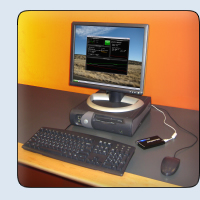
What Is An REG? - How Does It Work? -
How Can I Use It?
The Psyleron REG-1 represents the first generation mind-matter technology widely available for public use. Now anyone with a home computer can explore the direct impact of consciousness on the physical world, with the next generation of PEAR equipment—the portable, adaptable, and responsive Psyleron REG-1.
What Is An REG?

REG stands for "Random Event Generator." It is a device used in the scientific study of consciousness-related phenomena, particularly because research has shown that the mind can directly affect its output, and because it makes statistical calculations very straightforward. The REG-1 is easily interfaced with computers, allowing diverse software applications and data collection options.
It is useful to think of the REG-1 as an electronic coin flipper. Just as a flipped coin will land in a random heads or tails position, so will the REG-1 produce a random binary outcome—although instead of heads or tails, it produces a 1 or a 0. Each 1 or 0 is referred to as an event, hence random event generator. Unlike a coin flipper, however, the REG-1 is a quantum mechanical device, and thus is not affected by normal external physical forces. Its output is fundamentally random and impossible to predict.
REGs are used for studying consciousness-related phenomena because all of these factors make them best suited for the job. Their true randomness eliminates the concern that experimental outcomes might be influenced by factors other than consciousness. Their binary nature allows users to deal with known statistical distributions, and to measure any "anomalous" change in the distribution with simple statistical techniques. Results from REG trials can be seen in real time on a computer screen, then stored and graphed or analyzed in many different ways.
The Psyleron REG-1 is a true random event generator. Unlike the pseudo-random number generators built into computer software, the REG-1 produces truly random output—output that is fundamentally impossible to predict or to describe completely using a finite set of rules. Pseudo-random number generators, by contrast, produce output that is not truly random, and that is based on deterministic rules.
 Back to REG-1 Kit
Back to REG-1 Kit
 Order an REG-1 Kit Now
Order an REG-1 Kit Now